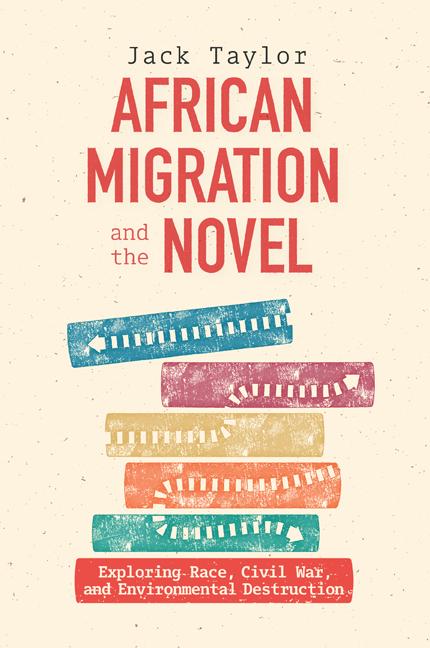Book contents
- Frontmatter
- Contents
- Acknowledgments
- Introduction: The Migratory Imagination
- 1 Migration, Sexual Exploitation, and the Form of the Afterlife of Slavery: Chika Unigwe’s On Black Sisters Street and Chris Abani’s Becoming Abigail
- 2 Refugee Livelihood, Racial Disorientation, and Mourning and Melancholy: Dinaw Mengestu’s The Beautiful Things That Heaven Bears and How to Read the Air
- 3 Hospitality, Forgiveness, and the Afterlife of Colonialism in the Paris Suburbs: Wilfried N’Sondè’s The Heart of the Leopard Children and The Silence of the Spirits
- 4 Migration and the Rwandan Genocide: Boubacar Boris Diop’s Murambi: The Book of Bones and Gilbert Gatore’s The Past Ahead
- 5 Environmental Devastation and Accumulation by Dispossession: Ishmael Beah’s Radiance of Tomorrow and In Koli Jean Bofane’s Congo INC.
- Coda
- Works Cited
- Index
Introduction: The Migratory Imagination
Published online by Cambridge University Press: 10 May 2024
- Frontmatter
- Contents
- Acknowledgments
- Introduction: The Migratory Imagination
- 1 Migration, Sexual Exploitation, and the Form of the Afterlife of Slavery: Chika Unigwe’s On Black Sisters Street and Chris Abani’s Becoming Abigail
- 2 Refugee Livelihood, Racial Disorientation, and Mourning and Melancholy: Dinaw Mengestu’s The Beautiful Things That Heaven Bears and How to Read the Air
- 3 Hospitality, Forgiveness, and the Afterlife of Colonialism in the Paris Suburbs: Wilfried N’Sondè’s The Heart of the Leopard Children and The Silence of the Spirits
- 4 Migration and the Rwandan Genocide: Boubacar Boris Diop’s Murambi: The Book of Bones and Gilbert Gatore’s The Past Ahead
- 5 Environmental Devastation and Accumulation by Dispossession: Ishmael Beah’s Radiance of Tomorrow and In Koli Jean Bofane’s Congo INC.
- Coda
- Works Cited
- Index
Summary
The fiction which imaginative literature offers us is not like that. It does not enslave; it liberates the mind of man. Its truth is not like the canons of an orthodoxy or the irrationality of prejudice and superstition. It begins as an adventure in self-discovery and ends in wisdom and humane conscience.
—Chinua Achebe, “The Truth of Fiction”I’ve heard it said that the novel is a work of the imagination. Even if that is true, this imagination must still have a place somewhere in reality.
—Sony Labou Tansi, The Shameful State: A NovelNovels of African migration open up the horizon for the possibility of exploring a host of pressing themes and political and social concerns. The goal of this book is to not simply chart a single theme—changes in subjectivity or identity, for example—under the banner of African migration literature. Rather, its purpose is to explore and expose the promise and possibility of African migration literature, specifically novels. Thus, the scope is intentionally broad in focus. As the title suggests, what I hope to demonstrate is that novels of African migration encompass a wide range of issues, including (but not restricted to) civil war, race and racism, and environmental devastation. This book is consciously designed to incorporate a host of migratory experiences, for example, exile because of civil war, participation by women in the sex trade in Antwerp, and the postmigration experience in Paris. This book, then, explores the imaginative worlds opened up by African migration literature and the migratory imagination that underwrites this body of literature. In the following introduction, I seek to do the following:
1. historicize African migration literature in its current manifestation by briefly presenting a synopsis of African migration literature;
2. introduce two categories that guide this project, the migratory imagination and an adaptable theoretical framework I have called theory on the move; and
3. providing an outline of each chapter in the book.
Migration has been a mainstay in African literature, a heterogenous body of literature representing a vast array of subject matters. Modern African literature is inaugurated with Chinua Achebe's 1958 consciousness-raising Things Fall Apart, though classic novels such as Amos Tutuola's The Palm-Wine Drinkard and My Life in the Bush of Ghosts precede Achebe's classic (Irele 2). Since its modern configuration, African literature has consistently taken up the issue of migration.
- Type
- Chapter
- Information
- African Migration and the NovelExploring Race, Civil War, and Environmental Destruction, pp. 1 - 28Publisher: Boydell & BrewerPrint publication year: 2024

